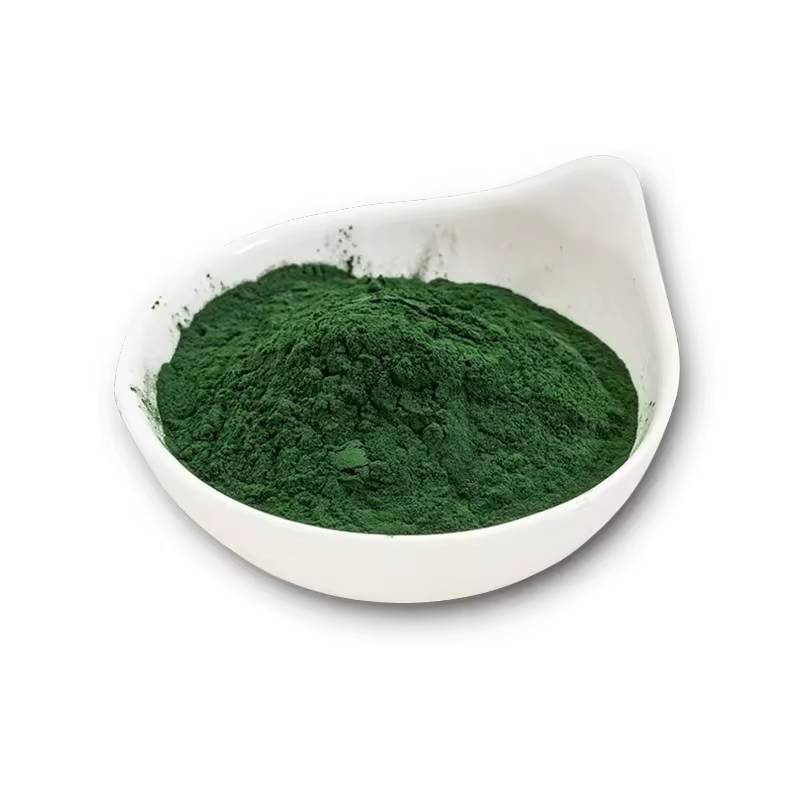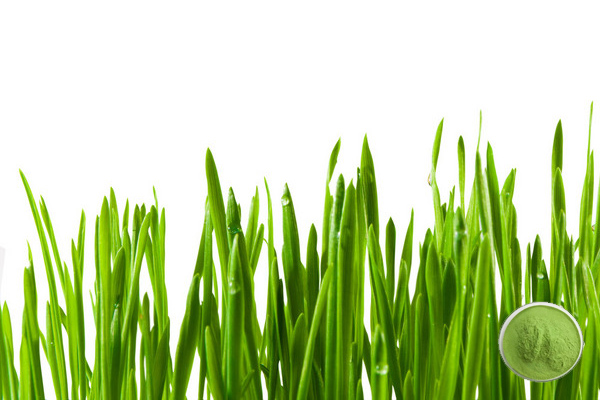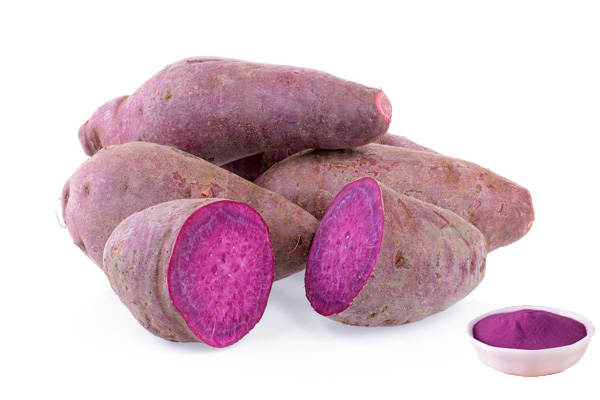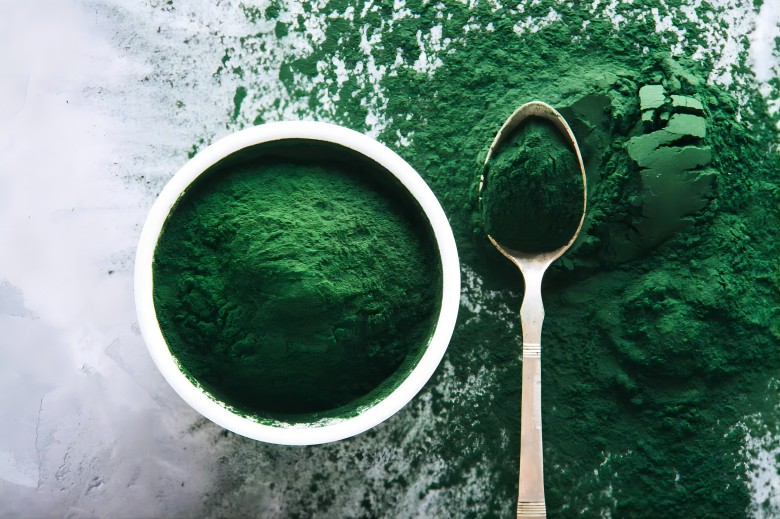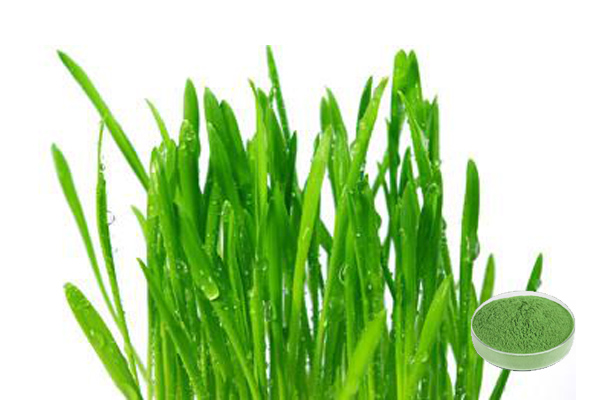피드 등급 Spirulina 분말 55% 단백질
활성 재료:단백질
검사:55%는
테스트 방법:Kjeldahl 결정
외관:진한 녹색 미세한 분말
잔류농약:(EC) No 396/2005기준을 준수합니다
- 설명
- 데이터 시트
- 인증 서
-
피드 등급 Spirulina 분말 무엇입니까?
스피룰리나는 인류가 자연계에서 발견한 가장 완전한 영양을 가진 가장 포괄적이고 균형이 잘 잡힌 녹색 자연식품이다다.단백질 함량은 65% 이상으로 높고 인체가 필요로 하는 각종 아미노산을 함유하고 있으며, 그 비율이 합리적이며, 인체가 흡수하고 이용하기에 가장 적합한 것으로, 인체에 필수적이고 인체에서 합성할 수 없는 9 종류의 아미노벤조산을 포함하고 있으며, 그 함량은 유엔에서 규정한 이상적인 표준과 거의 같다.또한 다양한 비타민, 미네랄, 엽록소가 풍부하며 청색과 다른 생물학적으로 활성 물질의 원천이다.
Green Spring Technology는 Spirulina obtusususus의 순수, 무공해, 고품질 조류 재배 기지에서 분무 건조, 시비, 멸균 과정을 통해 만들어지는 사료 등급의 Spirulina 파우더를 공급합니다.그것은 수용성 비타민이 풍부 한 단백질, EAA (18 종류), γ-linolenic 산성 (자연 불포화 지방산), β-carotene, 비타민 (VB12 콘 텐 츠는 가장 높은), superoxide SOD, 엽록소, 그리고 다른 영양소.그것은 동물 유기체의 면역력을 강화 할 수 있으며 높은 수준의 동물 사료 첨가제입니다.
2000년 설립된 그린스프링은 중국의 대표적인 생명공학 기업이다.ISO, HACCP 및 기타 품질 기준에 따라 생산하며, 제품은 모두 EU EC396, EU 2023/915기준 및 최고 용매 잔류 기준을 준수하는 국제 최고 업계 표준으로 구현됩니다.Green Spring은 Halal, Kosher, COSMOS, BRC, IFS, FDA, ISO 및 기타 많은 인증을 획득했습니다.권위 있는 제3자 테스트 보고서를 사용할 수 있습니다.
규격:
제품 이름
스 피 루 리나 파우더
유효 성분
단백질
검사
55%
시험 방법
Kjeldahl 결단력
외모
짙은 녹색의 Fine Powder
농약 잔류 물을
(EC) No 396/2005 표준을 준수합니다
규제:
EU 규정에 부합한다.
Learn More About Our Comprehensive Solutions for Compliant and Consistent Spirulina Extract Ingredients.
견적을 찾고 계십니까?Benefits:
Rich in Nutrients
Spirulina protein accounts for 50% -70% of cell dry weight and has a digestion and absorption rate of over 95%. It is a high-quality source of protein, surpassing meat, eggs, milk powder, grains, and soybeans. At the same time, there is a rich variety of amino acids, rich in all essential amino acids required by the human body, and the composition is reasonable, among which leucine, isoleucine, and valine have the highest content.
Rich in Chlorophyll
Chlorophyll in Spirulina is high in quantity and quality, accounting for 1.1% of the algal body, which is 2-3 times more than most terrestrial plants and 10 times more than common vegetables. The type of chlorophyll contained in Spirulina is mainly chlorophyll a. The molecular structure is very similar to human hemoglobin, which is the direct raw material for the synthesis of human hemoglobin.
Anti-inflammatory
The anti-inflammatory effects of Spirulina are mediated through its ability to block the release of histamine and other inflammatory substances from the immune system. Polyphenolic antioxidants and phycocyanin in algal cells exert their anti-inflammatory and antioxidant effects by integrating the NrF2 and NF-kB regulatory pathways; lipid extracts and alkanes also inhibit the expression and secretion of pro-inflammatory factors (TNF-alpha, IL-1beta, and IL-6) by suppressing the NF-kB pathway. A clinical trial showed that allergic rhinitis treated with spirulina significantly improves its symptoms, including improvement of runny nose, sneezing, nasal congestion, and itchy nose.
Immunity Regulation
Spirulina has a strong enhancing effect on the human immune system. Studies in different animal models, such as mice, chickens, and fish, have shown that Spirulina can improve the function of immune cells and immune organs, enhance the ability to function normally under the environment of infectious agents and toxins, and, at the same time, promote the value-added of bone marrow cells and enhance the production of IL-1 and antibodies by splenocytes cultured in vitro. Among them, Spirulina polysaccharides had a significant effect on increasing the number of antibody-producing cells and NK cell activity.
Microbiological Regulatory Activity
The microbiomodulatory activity of Spirulina prevents ecological disorders. The antimicrobial activity of Spirulina, on the one hand, protects the host from harmful bacterial infections, avoiding inflammatory bowel disease and metabolic and immune disorders, and on the other hand, promotes the growth of probiotic bacteria, thus restoring the normal microbial balance. Spirulina inhibits the growth of some Gram-negative bacteria (Escherichia coli, Pseudomonas aeruginosa, Proteus vulgaris) and Gram-positive bacteria (Staphylococcus aureus, Bacillus cereus) and produces extracellular metabolites with antimicrobial activity, which are particularly resistant to Streptococcus intestinalis, Staphylococcus epidermidis, Candida albicans, Staphylococcus aureus, and Escherichia coli.
On the other hand, Spirulina has a promoting effect on the growth and preservation of Lactococcus, Bifidobacterium, Lactobacillus acidophilus, Lactobacillus bulgaricus, Lactobacillus casei, and Streptococcus thermophilus. In vivo application studies also showed that microbiota composition, metabolism and immune disorders in the gastrointestinal tract were significantly altered in mice consuming Spirulina. Therefore, the combination application of Spirulina and probiotics has stronger immune and intestinal health regulating function than probiotics alone. It can be seen that Spirulina has an important role in improving animal and human health, changing the composition of intestinal flora, and promoting the growth of beneficial flora.
Applications:
For Feed Product:
Spirulina powder can be used for high-grade feed additives in addition to direct consumption as food or additives. Using Spirulina with feed to feed shrimp seedlings, and young abalone, compared with feeding with conventional feed, the survival rate of seedlings greatly improved.
In Cosmetics:
The polysaccharides and bioactive substances in Spirulina can reduce the formation of lipofuscin in tissues by scavenging free radicals in human body and reducing lipid peroxidation, thus reducing pigmentation, wrinkles, etc. It has the effects of moisturising, anti-aging and anti-ultraviolet rays. And spirulina will not stimulate the skin and produce allergic reactions, is a good cosmetic beauty products.
In the Food Field:
Spirulina powder is nutritious, rich in protein and a variety of amino acids, and has been used in a wide range of foods. Algae of the genus Spirulina have been widely used in the manufacture of pasta. The Spirulina-added products are characterized by enhanced nutritional, organoleptic, and therapeutic benefits compared to pasta without Spirulina.
-
Get Your Free COA


 영어
영어 프랑스
프랑스 스페인
스페인 러시아
러시아 한국
한국 일본
일본



